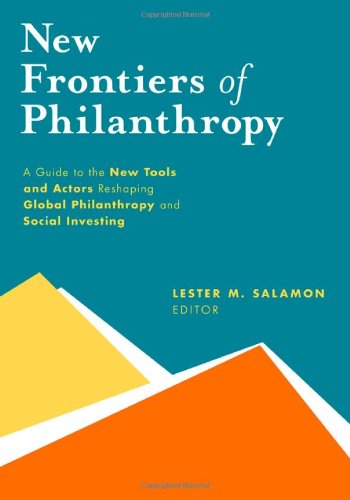Readers of Alliance are already likely to be acquainted with the concepts and practices that appear in these two books, but they are unlikely to have seen them all in one place or presented with such competence.
 The larger book, New Frontiers of Philanthropy: A guide to the new tools and actors re-shaping global philanthropy and social investing, will be welcomed by those who teach the expanding world of social investing, whereas the shorter Leverage for Good is the vehicle for Lester Salamon to capture readers’ interest in ‘the massive explosion in the tools of philanthropy and social investment, in the instruments and institutions being deployed to mobilize resources in support of social and environmental objectives’. Much of the shorter book appears in Salamon’s introduction to the larger book.
The larger book, New Frontiers of Philanthropy: A guide to the new tools and actors re-shaping global philanthropy and social investing, will be welcomed by those who teach the expanding world of social investing, whereas the shorter Leverage for Good is the vehicle for Lester Salamon to capture readers’ interest in ‘the massive explosion in the tools of philanthropy and social investment, in the instruments and institutions being deployed to mobilize resources in support of social and environmental objectives’. Much of the shorter book appears in Salamon’s introduction to the larger book.
Lester Salamon’s work as director of the Johns Hopkins Center for Civil Society Studies makes him well qualified to say how urgent are new models for financing and promoting social and environmental objectives: ‘the resources of both governments and traditional philanthropy [are] barely growing or are in decline’ while ‘the problems of poverty, ill health and environmental degradation [are] ballooning daily’. He is both knowledgeable and enthusiastic about the topic. As you read, you are caught up in the new ideas and experiences of ‘Enterprise brokers’, ‘On line portals and exchanges’, Social impact bonds’, ‘Fixed income securities’ – to name just a few of the 15 chapters. There are also chapters covering topics such as ‘Foundations as philanthropic banks’, ‘Capacity builders’ and ‘New forms of grant making’. As Salamon points out, ‘the new world of social impact investing requires the old world of traditional philanthropy in order to succeed.’
Reading the early chapters, I found myself worrying that the books seem to present a uniformly brave new world, but further reading shows that Salamon does not stint on presenting a more sober and realistic perspective. In Chapter 15 of the larger book he even gives space to Michael Edwards (author of Small Change: Why businesses won’t save the world) to mount an attack on the central premises of the book.
While seeing the enormous potential of the field, Salamon is hard-nosed about its limitations. While the tone of the books suggests that there is indeed a brave new world out there, with solid achievements being documented daily (many in these books), he acknowledges ‘the hard slog that lies ahead’.
 There are three issues that do not seem to this reader to be dealt with sufficiently. The first is the issue of what level of financial income is required for those aspiring towards ‘blended value’. Is it the market rate of return on capital, or are investors prepared to accept much below that? The rhetoric about both doing good and doing well often seems coy about saying what ‘doing well’ actually means to the investor, and what income he or she is prepared to settle for. The second is our increasing lack of trust, since 2008, in those using the instruments of finance. The financial crisis has shown us so many unethical people and practices that we find it difficult to accept many ostensibly good ideas at face value, looking for the trickery suspected. This needs to be addressed.
There are three issues that do not seem to this reader to be dealt with sufficiently. The first is the issue of what level of financial income is required for those aspiring towards ‘blended value’. Is it the market rate of return on capital, or are investors prepared to accept much below that? The rhetoric about both doing good and doing well often seems coy about saying what ‘doing well’ actually means to the investor, and what income he or she is prepared to settle for. The second is our increasing lack of trust, since 2008, in those using the instruments of finance. The financial crisis has shown us so many unethical people and practices that we find it difficult to accept many ostensibly good ideas at face value, looking for the trickery suspected. This needs to be addressed.
The third is the vexed issue of taxes. Many rich social investors do not pay the taxes that others have to pay, and then use their funds for social investment purposes. It may well be that their shorter and more direct route of social investment to effect improvements in social and environmental problems outperforms the longer route of taxation (with the government using those taxes for improved policies and practices), but there is little discussion of the topic.
With these caveats, these books provide rich and valuable sources of information and suggestions for ways of looking at the burgeoning, if complicated, field of social investing.
Richard Holloway is the author of Towards Financial Self-reliance: A handbook on resource mobilisation for CSOs. Earthscan, 2001.
About Leverage for Good
Published by
Oxford University Press
Price
$19.95/£12.99
ISBN
9780199376537
To order
http://www.globaloup.com
About New Frontiers of Philanthropy
Published by
Oxford University Press
Price
$55/£35.99
ISBN
9780199357543
To order
http://www.globaloup.com






Comments (0)